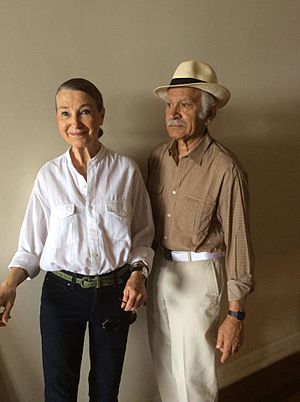Zulfikar Ghose facts for kids
Quick facts for kids
Zulfikar Ghose
|
|
|---|---|
| Born | March 13, 1935 Sialkot, Punjab, British India |
| Died | 30 June 2022 (aged 87) Austin, Texas , USA |
| Occupation | Novelist, poet, essayist |
| Education | Keele University |
| Spouse |
Helena de la Fontaine
(m. 1964) |
Zulfikar Ghose (born March 13, 1935, in Sialkot, India, now Pakistan – died June 30, 2022, in Austin, Texas) was a Pakistani-American writer. He wrote novels, poems, and essays. His books often used a style called magical realism. This style mixes real-life events with elements of fantasy and imagination.
Contents
About Zulfikar Ghose's Life
Zulfikar Ghose was born in Sialkot, a city in British India. His family was Muslim. His father, Khwaja Mohammed Ghose, was a businessman. In 1942, during the Second World War, his family moved to Bombay (now Mumbai).
Moving to a New Home
After India was divided into Pakistan and India, Zulfikar and his family moved to England. He went to Keele University and graduated in 1959. After college, he taught at Ealing Mead School in London.
Friends and Collaborations
While in England, Ghose became good friends with other writers. These included Anthony Smith and B. S. Johnson. They worked together on a book of student poems called Universities' Poetry. He also met famous poets like Ted Hughes and Sylvia Plath, and author Janet Burroway.
Early Writing Career
From 1963 to 1969, Ghose lived and wrote in London. He also worked as a sports reporter for The Observer newspaper. He wrote about cricket and hockey. During this time, he published two books of poetry: The Loss of India (1964) and Jets From Orange (1967).
He also wrote an autobiography, which is a book about his own life, called Confessions of a Native-Alien (1965). His first two novels were The Contradictions (1966) and The Murder of Aziz Khan (1969). The Contradictions looked at how Western and Eastern cultures were different. The Murder of Aziz Khan was about a farmer trying to protect his land from people who wanted to develop it.
Life in the United States
In 1964, Ghose married Helena de la Fontaine, an artist from Brazil. He later used Brazil as a setting for six of his novels. In 1969, he moved from London to the United States. He started teaching at the University of Texas in Austin. He taught English literature and creative writing there. He retired in 2007 as a professor. Ghose became a U.S. citizen in 2004.
Zulfikar Ghose's Books and Poems
In the 1970s, Ghose became well-known around the world for his three-part novel series called The Incredible Brazilian. This series tells a long, exciting story about Brazilian history. Other writers, like Thomas Berger and Paul Theroux, praised this work.
Other Novels and Collections
Zulfikar Ghose wrote many other novels. Some of these include Crump's Terms (1975), Hulme's Investigations into the Bogart Script (1981), and Figures of Enchantment (1986). He also wrote five books of literary criticism, which are studies of other authors' works.
He published several poetry collections, such as The Violent West (1972) and A Memory of Asia (1984). His poems often explored themes of travel and memories. In 2009, he released Beckett's Company, a collection of essays. His works have been translated into many different languages.
His Writing Style
Zulfikar Ghose believed that the most important parts of writing and art were style and beauty. He was known as a "writer's writer," meaning other writers admired his skill. He focused on creating beautiful language and vivid images in his stories and poems.
Awards and Recognition
In 1963, Zulfikar Ghose received a special award from the E. C. Gregory Trust. Famous people like T. S. Eliot helped choose the winners. A year before that, The Times Literary Supplement newspaper featured three of his poems. They highlighted him as an important poet from former British colonies.
In 1989, a special edition of The Review of Contemporary Fiction was dedicated to him and another writer, Milan Kundera. The editors said that Ghose was a "unique figure in contemporary literature." They compared his journey across different languages and countries to famous authors like Conrad and Nabokov.
Professor Mansoor Abbasi wrote a book about Zulfikar Ghose called Zulfikar Ghose: The Lost Son of the Punjab. Abbasi noted that Ghose's work was hard to put into one category. He said Ghose's writing was full of deep thoughts and beautiful, clear language.


